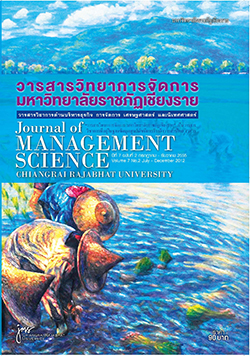The Impact of Consumer’s Knowledge and Firm’s Public Acceptance on Consumer’s Trust in Hydroponic Vegetable SMEs in Bangkok Province
Main Article Content
Abstract
The purpose of this research was to study the impact of consumer’s knowledge and firm’s public acceptance on consumer’s trust in hydroponic vegetable SMEs in Bangkok province. Samples of this study were hydroponic vegetable consumers 402 samples. This research employed the questionnaire as the method for data collection. Descriptive statistics for data analysis were percentage, means, standard deviation, variance. For inferential statistics of this research, the correlation and multiple linear regression were employed. For research findings, we found that consumer’s knowledge about firm’s identity, consumer’s overall satisfaction and firm’s public acceptance had the significant effect to consumer’s trust at the significant level less than 5%. Moreover, we also found that consumer knowledge about firm’s product (hydroponic vegetable), consumer knowledge of firm’s management and consumer perception of firm’s opportunistic behavior had the insignificant effects to consumer’s trust at the significant level less than 5%.
Article Details
Views and opinions expressed in the journal do not necessarily reflect those of the editors.


